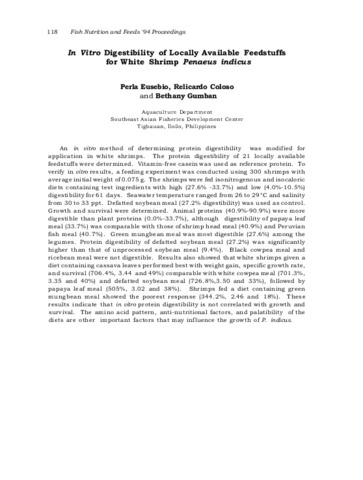In vitro digestibility of locally available feedstuffs for white shrimp Penaeus indicus
- Global styles
- MLA
- Vancouver
- Elsevier - Harvard
- APA
- Help
Share
Abstract
An in vitro method of determining protein digestibility was modified for application in white shrimps. The protein digestibility of 21 locally available feedstuffs were determined. Vitamin-free casein was used as reference protein. To verify in vitro results, a feeding experiment was conducted using 300 shrimps with average initial weight of 0.075 g. The shrimps were fed isonitrogenous and isocaloric diets containing test ingredients with high (27.6% -33.7%) and low (4.0%-10.5%) digestibility for 61 days. Seawater temperature ranged from 26 to 29°C and salinity from 30 to 33 ppt. Defatted soybean meal (27.2% digestibility) was used as control. Growth and survival were determined. Animal proteins (40.9%-90.9%) were more digestible than plant proteins (0.0%-33.7%), although digestibility of papaya leaf meal (33.7%) was comparable with those of shrimp head meal (40.9%) and Peruvian fish meal (40.7%). Green mungbean meal was most digestible (27.6%) among the legumes. Protein digestibility of defatted soybean meal (27.2%) was significantly higher than that of unprocessed soybean meal (9.4%). Black cowpea meal and ricebean meal were not digestible. Results also showed that white shrimps given a diet containing cassava leaves performed best with weight gain, specific growth rate, and survival (706.4%, 3.44 and 49%) comparable with white cowpea meal (701.3%, 3.35 and 40%) and defatted soybean meal (726.8%,3.50 and 33%), followed by papaya leaf meal (505%, 3.02 and 38%). Shrimps fed a diet containing green mungbean meal showed the poorest response (344.2%, 2.46 and 18%). These results indicate that in vitro protein digestibility is not correlated with growth and survival. The amino acid pattern, anti-nutritional factors, and palatibility of the diets are other important factors that may influence the growth of P. indicus.
Description
Abstract only
Type
Conference paperKoleksi



